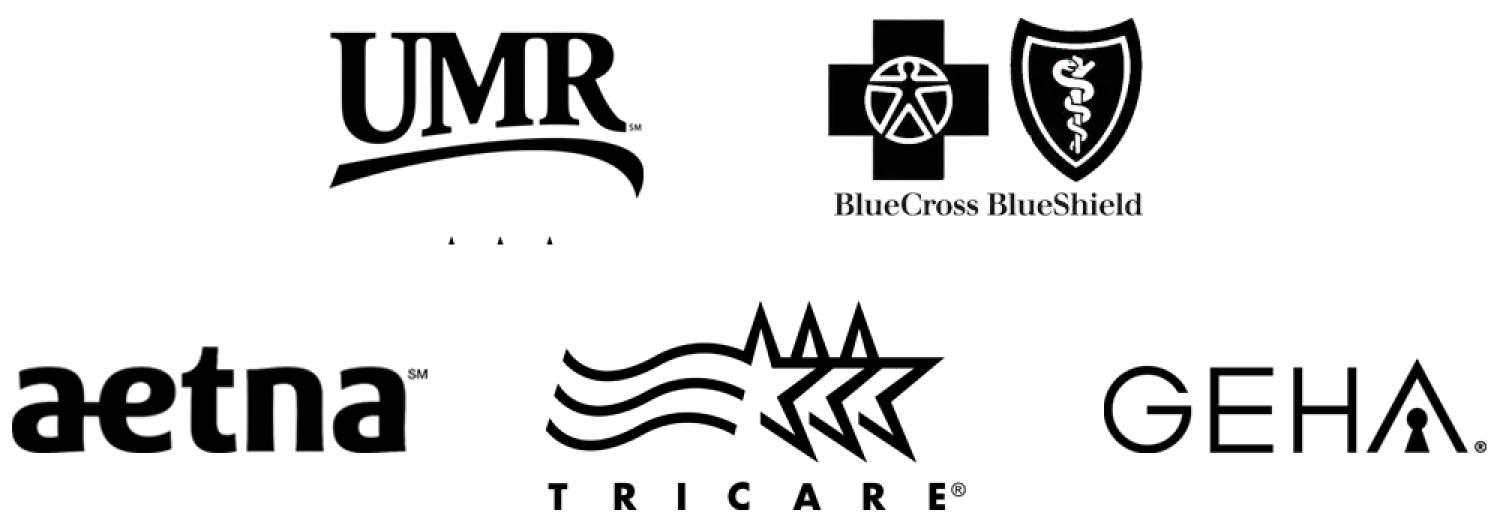Cornerstone
Understanding TriCare Drug Treatment Coverage
Learn about using your TriCare insurance policy to cover substance abuse treatment
Alcohol and Drug Treatment Coverage with TriCare
Jump to the following sections
View our addiction treatment locations
Addictions we treat at Cornerstone
TriCare drug treatment coverage
In-Network
Out-of-Network
When it comes to getting drug treatment with TriCare, choosing an in-network provider offers several advantages. In-network treatment centers have agreed to accept TriCare’s negotiated rates, which means lower out-of-pocket costs for you. You’ll also have an easier time with claims approval and processing. For some TriCare plans, such as TriCare Reserve Select, TriCare Young Adult, and TriCare Prime Remote, you can opt to receive care from an out-of-network provider, but the costs are higher than an in-network provider.
Other plans require you to go to an in-network provider. It’s important to note that an in-network provider with TriCare can offer you the least expensive coverage, as the rates negotiated between a provider and the TriCare insurance plan are usually the best possible value for TriCare members. However, the downside is that you may have fewer options when choosing a facility, and some in-network centers may have waiting lists or limited availability.
Opting for an out-of-network treatment center with TriCare has its pros and cons. On the plus side, you’ll have more freedom to choose a facility that meets your needs and preferences. However, out-of-network providers have yet to agree to TriCare’s rates, so you may face higher out-of-pocket costs. Claims approval can also be more complex, and you might need to pay upfront and seek reimbursement later. With some providers, you will be required to pay the entire cost of treatment upfront and wait several weeks for TriCare to reimburse you.
This cost could range from hundreds of dollars for outpatient treatment to thousands for inpatient treatment. Fortunately, if you use providers within the TriCare network, you are only responsible for the remaining costs after TriCare pays the provider the negotiated rate. If you choose a non-network provider, you will have a higher out-of-pocket cost. You can devise a payment plan with the provider to cover the remaining costs.
However, the easiest way to determine your coverage, benefits, and costs will be to speak with a TriCare representative and discuss which options offer the best value for your situation. It’s essential to weigh your priorities and financial situation when deciding between in-network and out-of-network care.
Information about Aetna Plan Types
TRICARE Prime (Health Maintenance Organization - HMO)
TRICARE Prime is a mandatory plan for active-duty members of the military. It covers active duty and retired military members and their families, as well as activated members of the National Guard and their families.
TRICARE Prime offers coverage for most forms of substance misuse treatment, including inpatient and outpatient treatment and detox.
Like an HMO, you must choose a primary care physician to coordinate your care and provide specialist referrals. You’ll have lower out-of-pocket costs but less flexibility in choosing providers.
TRICARE Select (Preferred Provider Organization - PPO)
TRICARE Select is another option for active duty and retired military members and their families.
While members have additional choices in the providers they see, there are higher costs. This coverage is very similar to TRICARE Prime, but certain services must be approved before they’re authorized.
Like a PPO, TRICARE Select gives you more freedom to see out-of-network providers, but you’ll pay more for those services. You won’t need referrals to see specialists.
TRICARE Standard Overseas (Exclusive Provider Organization - EPO)
TRICARE Standard Overseas is a plan offered to active-duty and retired military members and families that allows a choice of providers but has higher costs.
As with the TRICARE Standard, authorization is required for many services. Like an EPO, you’ll need to stay within the plan’s network, but you won’t need to choose a primary care physician or get referrals.
TRICARE Reserve Select (Point of Service - POS)
TRICARE Reserve Select coverage is for reserve members who are not on active duty. It resembles a typical insurance plan with a deductible, monthly payments, and a provider network.
Members can choose to go to a non-network provider for treatment but will pay a higher deductible and copay.
This is comparable to a POS plan, which blends elements of HMOs and PPOs. You’ll have a primary care physician but can see out-of-network providers at a higher cost.
TRICARE Retired Reserve (High Deductible Health Plan - HDHP)
TRICARE Retired Reserve offers coverage for eligible retired reserve service members under 60 and some surviving spouses of eligible retired reserve members.
As with Reserve Select, members of this plan have monthly premiums, deductibles, and copays but can use non-network providers at a higher cost.
This plan is similar to an HDHP, which has lower premiums but higher deductibles. They’re often paired with a health savings account (HSA) to help you save for medical expenses.
TRICARE for Life & TRICARE Young Adult (Medicaid & Medicare Plans)
TRICARE for Life is a program for people who receive Medicare Part A and B. It is a form of health insurance that covers many expenses that Medicare does not.
TRICARE Young Adult offers coverage for those needing healthcare after their “regular” TRICARE coverage ends after age 21 (23 if in college).
You must also be under 26, unmarried, and the child of an eligible TRICARE member. These plans work alongside Medicaid and Medicare to provide comprehensive coverage.
Understanding Policy Terminology
Deductible
Co-Insurance
Out-of-Pocket Max
The deductible is the amount you pay out of pocket for covered healthcare services before your insurance plan starts to pay. For example, if your plan has a $1,000 deductible, you must pay the first $1,000 of covered services yourself. After you have paid your deductible, your insurance will begin to pay its share of the costs. Deductibles can vary depending on your specific TriCare plan and whether you choose an in-network or out-of-network provider.
Co-insurance is the percentage of the cost of a covered healthcare service after you’ve met your deductible. For instance, if your plan has a 20% co-insurance and you’ve already paid your deductible, you will pay 20% of the cost of a covered service while your insurance pays the remaining 80%. Like deductibles, co-insurance can vary based on your TriCare plan and your choice of healthcare provider.
The out-of-pocket max is the maximum amount you will pay for covered healthcare services in a year, including your deductibles, co-payments, and co-insurance. Once you have reached this limit, your insurance will cover 100% of the costs for the remainder of the year. This provides a safety net, ensuring you don’t face unlimited medical expenses. The out-of-pocket max can differ based on your TriCare plan, so reviewing your policy carefully is essential.
Understanding these terms is crucial when choosing a TriCare plan and budgeting your healthcare expenses. Be sure to compare deductibles, co-insurance, and out-of-pocket maximums across different plans to find the one that best fits your needs and financial situation. If you have any questions, don’t hesitate to contact a TriCare representative for clarification and guidance.
TriCare Approval Process for Treatment
Verification
Submission
Adjudication
Payment
Appeal
The first step in the approval process is verification. The treatment center will verify your TriCare coverage and determine what your specific plan covers. They will contact TriCare to confirm your eligibility and get details on your benefits, including any deductibles, co-payments, or co-insurance amounts. The treatment center will then let you know if you’ll need to pay anything out of pocket for your treatment. It’s important to provide accurate information to the treatment center so they can verify your coverage correctly. You can check your verified insurance here.
Once your coverage has been verified, the next step is submission. The treatment center will submit a claim to TriCare on your behalf. This claim will include detailed information about the services you received, such as the dates of treatment, the types of therapy or medication provided, and the associated costs. The treatment center will use specific codes to ensure that TriCare understands exactly what services were rendered during submission.
After receiving the submitted claim, TriCare will begin the adjudication process. During adjudication, TriCare will review the claim to determine whether the services are covered under your specific plan. They will check if the treatment was medically necessary if an approved provider provided it, and if it falls within your plan’s coverage limits. The adjudication process can take some time, depending on the complexity of the claim and the volume of claims TriCare is processing.
If your claim is approved during adjudication, the next step is payment. TriCare will pay its portion of the costs directly to the treatment center. You will then be responsible for paying any remaining costs, such as your deductible, co-payments, or co-insurance. The treatment center will bill you for these amounts and may offer payment plans or financial assistance if needed. It’s crucial to understand your financial responsibilities before beginning treatment.
If your claim is denied during adjudication, don’t panic. The appeal process is designed to help you get the coverage you need. Denials can happen for various reasons, such as incomplete information, coding errors, or services not covered under your plan. Your treatment center’s billing department is experienced in dealing with denials and will likely file an appeal on your behalf. They will gather additional information, correct errors, and explain why the services should be covered. In most cases, the treatment center will work hard to ensure that you only receive services that are likely to be approved. However, in the event of a denial, they will advocate for you and work to get the decision overturned through the appeal process. This lets you focus on your recovery while they handle the insurance issues.
Get Help Paying Your Deductible
File a Hardship With TriCare
If paying your deductible would cause significant financial strain, you may be able to file a hardship request with TriCare. A hardship is a situation that causes significant financial difficulty, such as a loss of income, unexpected medical expenses, or a natural disaster.
To file a hardship, you must contact TriCare directly and provide documentation of your financial situation. If your hardship request is approved, TriCare may waive or reduce your deductible, making it easier to afford the necessary treatment.
Assistance Programs & Payment Plans
Many treatment centers offer financial assistance programs or payment plans to help make treatment more affordable. These programs can help you cover your deductible or spread the cost of treatment over time.
Some centers may have sliding-scale fees based on income, while others may offer grants or scholarships. When exploring treatment centers, be bold and ask about these options.
Feel free to explain your financial situation and ask for help. The admissions staff at the treatment center can work with you to find a solution that fits your budget.
Community Resources & Charitable Organizations
FAQs About Using TriCare Benefits to Pay for Alcohol and Drug Treatment
Will TriCare cover the full cost of drug treatment?
The amount TriCare covers depends on several factors, including your specific plan, deductible, and whether you choose an in-network or out-of-network provider. You’ll often be responsible for some out-of-pocket costs, such as deductibles, co-payments, or co-insurance. However, TriCare does provide coverage for a wide range of drug treatment services, including detox, inpatient rehab, outpatient therapy, and medication-assisted treatment. Reviewing your specific plan documents and working with the treatment center to understand your financial responsibilities is important.
What types of treatment does TriCare cover?
TRICARE health insurance provides coverage for a range of drug and alcohol rehab treatments, though the specific coverage can depend on the provider, the member’s health plan, and other factors. Many rehab centers accept TRICARE, but verifying coverage before beginning treatment is important.
TRICARE plans often cover several types of drug and alcohol detox, but having TRICARE inpatient coverage doesn’t guarantee full coverage for detox services. Detox centers that accept TRICARE may require partial fees or doctor authorization based on your specific plan. For example, you may need to meet certain criteria for admission to an inpatient detox program, and TRICARE may determine that outpatient detox is sufficient for your needs.
TRICARE covers inpatient rehab for drug and alcohol abuse if you meet the necessary criteria for this level of care. Treatment providers follow specific guidelines to determine if inpatient care is appropriate, so speaking with a TRICARE representative is the first step in understanding your coverage. If you are in immediate medical danger, TRICARE will provide medically necessary treatment to stabilize your condition.
TRICARE also offers coverage for outpatient rehab, which allows patients to live at home or in a sober living environment during treatment. This type of rehab is suitable for people who need substance misuse treatment but don’t require 24/7 supervision. Outpatient rehab can serve as a step down from inpatient treatment or as a first-time treatment option.
TRICARE may cover partial hospitalization programs (PHPs) and intensive outpatient programs (IOPs) within the outpatient treatment category. PHPs, also known as day treatment, provide intensive, structured care similar to inpatient rehab but with slightly lower intensity and the ability to live at home. IOPs are also similar to inpatient treatment but with less intensive therapy and fewer weekly sessions compared to PHPs.
While coverage limitations, required authorizations, and out-of-pocket expenses can vary based on plans and facilities, TRICARE generally covers standard outpatient rehab, PHP treatment, and IOP treatment. It’s essential to work with your TRICARE representative and chosen treatment provider to understand your specific benefits and any associated costs.
Does TriCare cover therapy?
Yes, TRICARE provides coverage for a wide range of psychotherapy services for its members. This includes individual therapy sessions, counseling appointments, marriage and family counseling, and various forms of group therapy designed to address different mental health conditions. In addition to these standard therapy options, TRICARE may also cover psychological testing and assessments that help diagnose patients with specific mental health disorders. Some plans may even provide coverage for experiential therapies, such as art therapy and music therapy, though this can vary depending on the specific plan and provider. It’s important to check with your TRICARE representative to understand the specific therapy benefits included in your plan.
Sources
CLINICALLY REVIEWED

Lionel Estrada, LISAC
CLINICAL DIRECTOR
Lionel, our Clinical Director is a Licensed Independent Substance Abuse Counselor (LISAC) with over 4 years at Cornerstone, specializes in addiction and mental health. Trained in EMDR therapy, he employs a trauma-informed, empathetic approach to address the underlying causes of these issues.
- Read our Editorial Policy
Still have questions about treatment?
Our admissions specialists are here to explain the process, answer any questions you may have, and ensure you’re getting the help you need to live a healthy life free from addiction.























